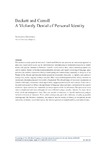Beckett and Carroll. A violantly denial of personal identity

Ver/
Use este enlace para citar
http://hdl.handle.net/2183/13332Coleccións
Metadatos
Mostrar o rexistro completo do ítemTítulo
Beckett and Carroll. A violantly denial of personal identityAutor(es)
Data
2012Cita bibliográfica
Culture of communication / Communication of culture, 2012: 385-394. ISBN: 978-84-9749-522-6
Resumo
[Abstract] The intention to make parallels between L. Carroll and S.Beckett and proposes an intertextual approach to show how much Caroll`s work can be interpreted as a foreshadowing of postmodern discourse in modern drama with specific reference to Beckett’s. Carroll`s works tend to show certain interesting aspects that were to interest Beckett in his drama and postmodern concepts with regard to meaning of language, space and time, the problem of personal identity.Carroll prefigures modern drama, especially in the guise of the Theatre of the Absurd, and provides fertile ground for postmodern discourse - a radically new notion of setting, time, action, language, dialogue and plot. Man is seen as disintegrated and his society presented as increasingly deconstructing and irrecoverably fragmented. This absurd image of man is not unconnected to Carroll’s philosophy of nonsense which significantly engages questions of life and existence. T shec tion of the paper is structured as follows; the significance of language, space and time, characters and the question of identity. Space and time are undeniably important aspects of the Carroll stories. The space-time theme takes a complicated and more philosophical turn in Beckett’s plays- actually indicates the caged nature of the world and nothingness in time. There are number of characters in Carroll’s stories that prefigure Beckett’s treatment of characters. Their verbal exchange only point sth e difficulty of codifying possible meanings and, like Beckett’s characters, they seem to have no society, no history, no occupation, no real personality or identity except their names, that helps to generate incomprehensibility and indeterminacy.
ISBN
978-84-9749-522-6





